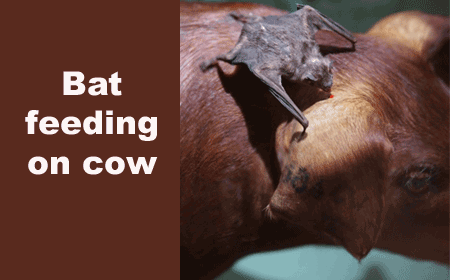BELIZE, Thurs. June 7, 2018– Yesterday, the Belize Agricultural Health Authority (BAHA) issued a press release warning the public, especially cattle farmers, of an outbreak of rabies that has been affecting cattle in the Belize, Orange Walk, and Cayo Districts.
Today, we spoke to Dr. Miguel Depaz, Director of Animal Health at BAHA, who told us that this outbreak has been ongoing since January 2016. The first cases surfaced in the Toledo District, and then the disease eventually spread to the Corozal and Orange Walk Districts.
According to the press release, the disease is transmitted by the vampire bat, and humans, cattle, and wildlife are susceptible to it.
Dr. Depaz said that one warning sign of rabies in cattle is nervous tremors, which would then lead to the cow becoming recumbent, meaning they would remain lying down. Other warning signs in cattle include convulsions and excessive salivation.
Depaz said that this disease has a 100% mortality rate if left untreated. He stated that once a case is reported, they would travel to the farm and euthanize the animal in order to not let it suffer. Once it is dead, BAHA removes the animal’s brain, and it is tested to verify that rabies was indeed the cause of the symptoms exhibited by the animal.
Fortunately, said Dr. Depaz, there have been no reported case of rabies in humans in Belize; however, there have been over 60,000 cases of it in other parts of the world, especially in Asia and Africa.
BAHA and the Ministry of Health are collaborating to implement prevention and control measures. However, they require assistance from the public.
According to the release, farmers are expected to vaccinate their cattle against the disease, as well as vaccinate calves that are three-months old. Farmers are encouraged to not wait until the next vaccination cycle.
Members of the public are also advised to vaccinate their cats and dogs for rabies. The MoH (Ministry of Health) and BAHA are vaccinating these animals in all areas affected by the outbreak.
When it comes to vaccines, the release states that those administering the vaccines should ensure that the cold chain has been maintained. Cold chain refers to the temperature-controlled chain of supply that includes production, storage, and distribution activities.
Vaccine suppliers also should not sell vaccines that are not packaged in proper containers that would maintain the cold chain. Farmers should maintain this cold chain until the point of vaccination of the animals, and they should not use the vaccine after two hours of opening it. The release also states that farmers should not store used vaccines.
Dr. Depaz emphasized that this disease is completely preventable once animals are properly immunized.
BAHA warns members of the public against handling wildlife and entering areas such as caves and abandoned buildings where bats might be present, so as to reduce the risk of catching the rabies virus themselves. MoH is also providing post-exposure vaccinations to humans who have been exposed, but they stress that it is always better to prevent exposure in the first place.
Depaz said that once farmers report to BAHA that their animals are being bitten by bats, BAHA personnel go out and set up bat nets in the area to trap them, as a way to eliminate the virus at the source. Once the bats are captured, they are smeared with an anticoagulant paste, and when they return to their roosting nests, other bats would groom them. This paste would kill 25 to 30 bats in the nest.
Lastly, the press release encourages members of the public to immediately report all suspected cases of rabies in animals to BAHA.

